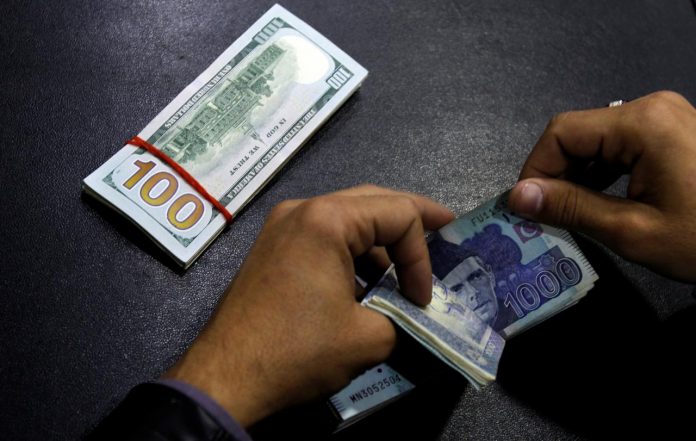LAHORE: Rupee’s tumble seems to have begun. What many feared as a consequence of the deal with the IMF has finally started to become a reality. The interbank market opened on Thursday with the Pakistani Rupee (PKR) down by Rs4.6 against the US Dollar, as the banks are currently quoting the currency at Rs146/147 per USD as compared to Wednesday’s closing quote of Rs141.39 per USD.
Ibrahim Moosa for Mettis Global told Profit, “The Pakistani rupee is expected to depreciate against the US dollar further and the market expectation is at around Rs147-148.”
Earlier on Wednesday, the increase of Rs2.25 within the open market took the US dollar to record levels in Pakistan and it came amid strong speculations that the “local currency will depreciate further in the wake of the International Monetary Fund’s (IMF) harsher conditions”. On Wednesday the Pakistani rupee touched an all-time high of Rs146.2 before bouncing back to Rs144 in the open market.
Pakistan’s $6 billion bailout agreement with the IMF, signed on Sunday, has met with serious criticism, as investors and analysts have expressed serious doubts over the reported conditions of the deal.
Pak Kuwait Investment AVP Research Adnan Sami Sheikh while talking to Profit said, “The Pakistan Tehreek-e-Insaf (PTI) led government is underplaying the impact of the deal with the IMF on the economy and the general public.”
He added, “As consumption and growth slows down, corporate earnings are going to decline as well. This will ultimately lead to job cuts and unemployment, which are already a huge problem for Pakistan.”
He further added, “Under the current policies incomes will also fall as taxes and costs rise, ultimately putting the burden on the general public”.
Adnan speculated that the rupee will continue to fall and is expected to fall to around Rs180 by December 2020.
Effect on Rupee
Ibrahim told Profit, “If allowed, the market forces will independently drive the value of domestic currency henceforth, given that the IMF itself said that the exchange rate will be brought to market-determined rate which means that the State Bank of Pakistan (SBP) will no longer be directing the value of PKR to the currency dealers. This is likely to bring the local currency in line with the Real Effective Exchange Rate (REER) in the long run, whereas the market expects REER to fall below 100 in the short-run.”
Overall outlook
While talking about the overall outlook, Ibrahim said, “As the IMF programmes prioritise long term growth over short term growth, it entails that these programmes influence governments into taking harsh economic measures which might be painful in the short term, such as fiscal consolidation, tariff hikes and withdrawal of subsidies.”
“Speaking of equity markets, stepping into an agreement has definitely dissipated the haze of uncertainty that had taken over the trading floors for a long time now. While the initial response to the conditions was bitter, we feel the response in the long-run will be definitely much better,” he added.





Failed Pti government
Captain of Pakistan team has gone MAD. He has started batting against PakRs rather than against Eco ball. Only offshore energy can save us against min experienced new bees.